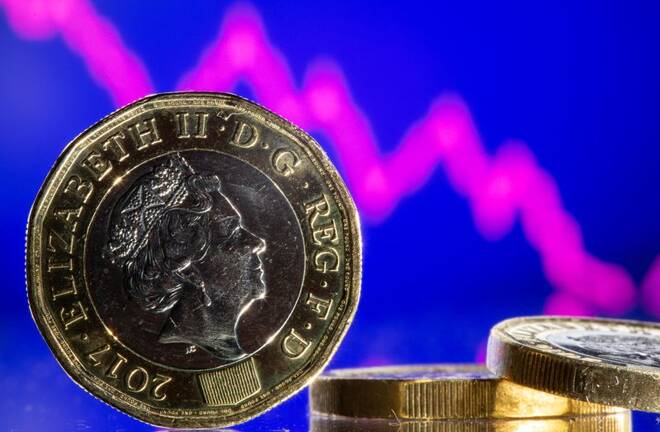Advertisement
Advertisement
Sterling jumps to December highs after BoE raises rates
By:
By Stefano Rebaudo (Reuters) - Sterling edged up on Thursday ahead of Bank of England and European Central Bank policy decisions, with investors keen to see if the rapid spread of the Omicron coronavirus variant stays the BoE's hand despite a sharp rise in inflation.
By Stefano Rebaudo
(Reuters) -Sterling jumped to December highs versus the euro and the dollar on Thursday after the Bank of England surprised investors by hiking interest rates, while the European Central Bank announced a reduction of its monetary stimulus.
Britain became the first G7 economy to hike rates since the onset of the pandemic, and the U.S. Federal Reserve also signalled plans to tighten policy in 2022, while the ECB only slightly reined in stimulus.
Sterling was up 0.4% at $1.3319, while it rose 0.4% versus the euro to 84.85 pence.
It hit its highest levels since the end of November versus the euro and the dollar respectively, at 84.54 pence and 1.3375.
“Having first guided markets into betting on a rate hike in November, the Bank of England today defied market expectations again by finally pulling the trigger,” Berenberg’s economist Holger Schmieding said.
“We expect a further 25 basis point hike in February 2022 to take the bank rate to 0.5%,” he said, adding that his forecast for the UK rate at end-2022 was stable at 0.75%.
Several analysts had flagged that BoE could allocate more significance to the pandemic at its policy meeting, despite recent robust economic data.
Daily hospital admissions in Britain could soon hit a new high because the Omicron variant of the coronavirus is spreading so fast, piling pressure on a health service struggling with staff sickness, England’s Chief Medical Officer said on Thursday. [nL8N2T140H]
“The announcement does look like a bit of a panic move – the Bank of England is probably regretting its decision not to move last month when Omicron wasn’t even an issue,” said Chris Beauchamp, chief market analyst at IG Group.
Data on Wednesday showed British consumer price inflation leapt by far more than expected and hit a decade-high 5.1% in November.
Political risks continue to weigh on sentiment as Prime Minister Boris Johnson faces turmoil in his Conservative Party over measures to curb the COVID-19 outbreak’s spread and a public outcry over alleged office parties at Downing Street during last year’s lockdowns.
Voters went to the polls in a region of central England to elect a new member of parliament in a test of British Prime Minister Boris Johnson’s authority after accusations of sleaze and his handling of the COVID-19 pandemic. [nL1N2T11J4]
(Reporting by Stefano Rebaudo; Editing by Bernadette Baum)
About the Author
Reuterscontributor
Reuters, the news and media division of Thomson Reuters, is the world’s largest international multimedia news provider reaching more than one billion people every day. Reuters provides trusted business, financial, national, and international news to professionals via Thomson Reuters desktops, the world's media organizations, and directly to consumers at Reuters.com and via Reuters TV. Learn more about Thomson Reuters products:
Did you find this article useful?
Latest news and analysis
Advertisement
